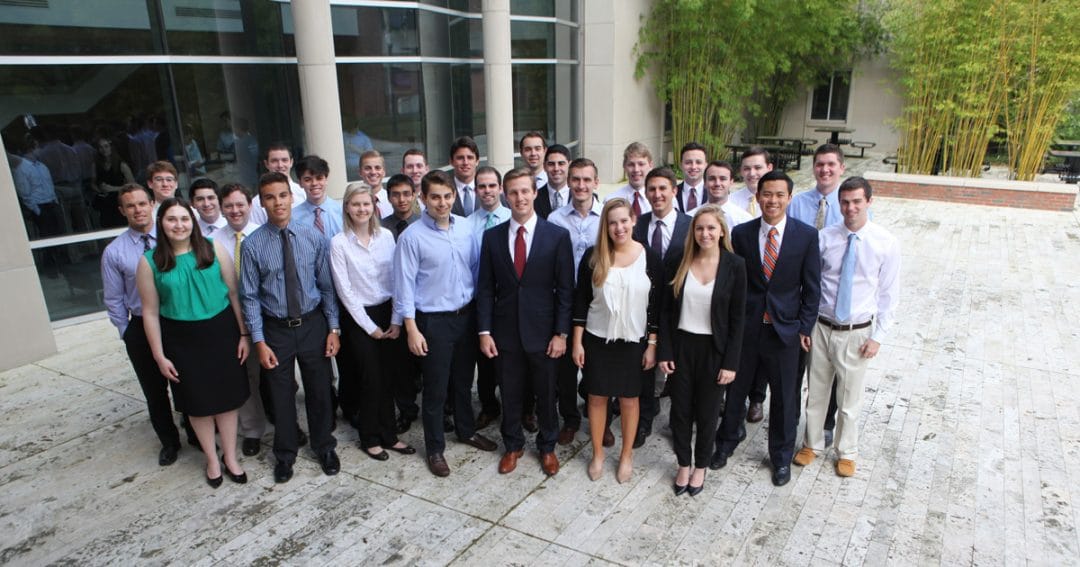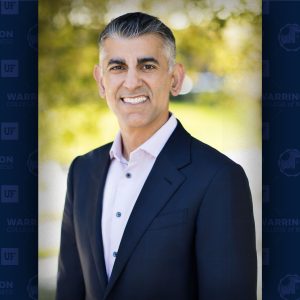GSIF’s stock rising
Learning and real-world experience go hand in hand at the Gator Student Investment Fund (GSIF), a student-run investment portfolio operated by the Master of Science in Finance (The William R. Hough Program).
“The purpose of the fund isn’t to make money,” said Michael Pappas, a recent graduate of the MSF program and past GSIF portfolio manager. “The purpose of the fund is to learn.”
Yet that learning has translated into financial success. The fund’s portfolio increased by 72 percent over the past two and a half years. The benchmark the fund uses as a comparison increased by only 51 percent, according to Larry Smith, GSIF advisory board chair and Chairman and Chief Investment Officer of Third Wave Global Investors, LLC.
“Any investment management firm would be proud to say they’ve achieved those numbers,” Smith said.
“The performance has been nothing short of outstanding,” he said. “The students ultimately are the ones who deserve all the credit for what they’ve put together as a process, as well as the performance that they’ve achieved.”
Beginning in the 2011-12 academic year, GSIF began using real money donated by friends of the College. Within a year, it changed its investment model to the “Core-Plus” Model with the goal of mitigating risk while outperforming the fund’s benchmark, the Russell 3000.
The model allows for between 40 and 60 percent of the stocks selected to reflect the benchmark. Six economic sector teams pick the remaining stocks, each researching to find the company they think will outperform its competitors. The portfolio managers then review the research and make the final decision on which stocks to invest in, said Joseph Jurbala (MSF ’15), a past GSIF portfolio manager and Analyst for Jefferies LLC in New York.
Smith said the portfolio management process gives a higher probability that picking good stocks within each sector will translate into good performance.
“They’ve found the right stocks; they followed the disciplined process we put in place,” Smith said. “And it’s translated into just really exceptional numbers.”
That process of working within the stock market includes researching stocks, companies and economic environments in industry sectors; writing research reports; making pitches and then using real money to invest in stocks. And as portfolio managers, Pappas and Jurbala gained experience in managing people as well.
“GSIF helps to bridge that gap because it allows students to take what they’ve learned in the classroom and apply it in a real-world investing scenario,” said Pappas (MSF ’15), now an Analyst at Evercore Partners in New York. “The analysis that we do in GSIF, is more or less the same analysis we do at work.”
In the five years since its inception, the fund has grown into a network of Gator investors. As portfolio managers, Jurbala and Pappas said they worked to connect fund members with GSIF alumni by telling students who to reach out to at what investment firms.
From the alumni perspective, the fund is also a way to give back to the College.
“It keeps me connected to the school and gives me the opportunity to mentor students,” said Jonathan Luo (MSF ’10), who began the fund in 2009 as a means to help students get Wall Street jobs. “At the same time, it really helps kids that are currently in school get access to alumni.”
Which is something Luo has experienced firsthand. He said members of GSIF email him nearly every quarter, asking for career-related and interview advice.
“It [GSIF] builds a community that extends past Florida,” Luo said. “Every year, top kids from GSIF end up in the top spots on Wall Street.”
Luo, who started job searching immediately after the fiscal crisis in 2009, said having the fund on his résumé was “absolutely critical.” It gave him the opportunity to demonstrate to interviewers how interested he was in finance.
Smith stressed the value of students talking about the investment fund at interviews, especially within the competitive job environment.
“You just don’t see that many students with that level of real-world knowledge that our GSIF students are leaving the university with,” he said.
—Laura Hogan (BSPR ’14)




